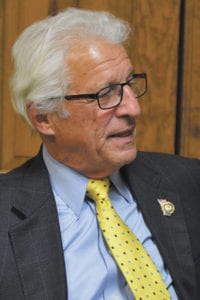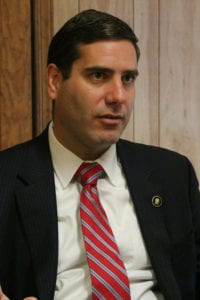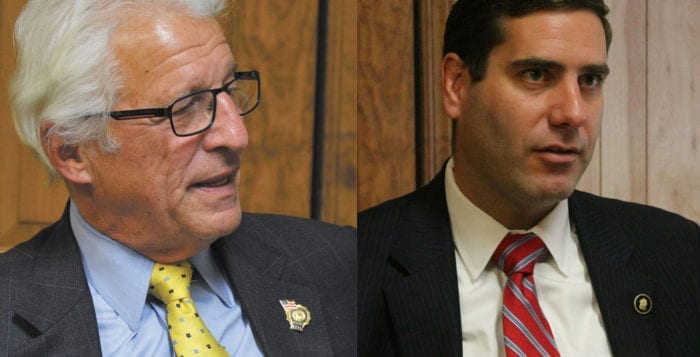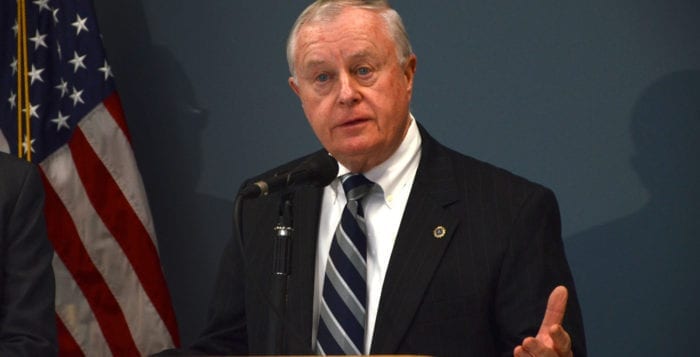In life, timing is everything.
Thanks to the indictment of current Suffolk County District Attorney Thomas Spota (D) Oct. 25 for his alleged involvement in the cover-up of former Suffolk Police Commissioner James Burke’s civil rights violation — a charge the ex-police chief pleaded guilty to in 2016 — the high-profile race to be the next DA in Suffolk just got a brighter spotlight.
The next DA — be it Burke’s replacement in the police department, Democrat Tim Sini, or Huntington resident and criminal lawyer with more than 40 years of experience, Republican Ray Perini — will be tasked with restoring public faith in a position now synonymous with corruption. The two candidates have publicly traded barbs during the campaign, and that didn’t stop during their individual interviews at TBR News Media’s Setauket office in October.

Perini said a key distinction in this race is he is not a politician. His first attempt at political office came four years ago when Perini decided to challenge Spota because he said he was concerned the incumbent would be cross endorsed by both Republicans and Democrats.
“You’ve lost your moral ability to lead an office,” Perini said of Spota, after his announcement that he would be stepping down before the end of the year. “He had to step down for the good of the office.”
The challenger began his career as a lawyer in the 1970s in the Brooklyn District Attorney’s office, and he spent time working on both narcotics cases and homicides while in Brooklyn. In 1976, he moved to Suffolk County to head its narcotics bureau, where he tried one or two major cases each year, he said.
“There’s nothing I haven’t done as a criminal prosecutor, and I’m very proud,” he said. “I believe I have had a very successful career.”
Perini said he believes his background suits him perfectly to be the next Suffolk DA.
“It’s what I’ve trained my whole life to do,” Perini said. He added his experiences have prepared him to tackle two of the county’s biggest problems: drug addiction and gang infiltration. “I was successful because I actually worked on a daily basis with the [U.S. Drug Enforcement Administration] task force and you can’t do that kind of work without working with the FBI and the DEA.”
Sini also got his foot in the door as a lawyer to the west. He was the assistant U.S. Attorney for the Southern District of New York working as a federal prosecutor under Preet Bharara, where he said he specialized in violent crime cases.
“I loved my job — I loved bringing justice to victims or family members of victims,” he said.

The Babylon resident said he always wanted to make his way back to Suffolk. He eventually returned to serve as the deputy county executive under County Executive Steve Bellone (D), specializing in public safety initiatives. As the successor to Burke, he said he has experience taking over a department in turmoil.
“I have a proven track record of leadership in difficult situations,” Sini said. “I walked into the police department during a scandal and if I’m elected DA I’ll be walking into the district attorney’s office amidst a scandal.”
He explained why he thinks he’s a fit for the position.
“This is, in my opinion, the most important position in Suffolk County,” Sini said of the DA. “The level of responsibility that the district attorney has is enormous. I’m running for district attorney to restore integrity to the leadership of the district attorney’s office, which is sorely needed.”
Both were critical of the other’s assertions that their background has prepared them to serve as district attorney.
Sini pointed out Perini’s resignation from the narcotics bureau amid allegations of illegal wiretapping. A New York State Commission of Investigation report named Perini more than 100 times, according to Sini. The police commissioner has also been vocal about annual parties his opponent chartered for local district attorneys and judges, which Sini saw as a sign of impropriety.
Perini attributed the issues to two narcotics officers within his 12-person department who “went bad,” and said he investigated when allegations arose, eventually forcing the pair to resign, making no attempt at a cover-up. He defended his decision to host the boat parties as standard operating practice amongst defense attorneys, judges and prosecutors who work together closely.

“People have this image of a yacht and call girls — it wasn’t that,” he said. “We don’t do X-rated parties. I never thought it would be this kind of issue. Would I do it again? Of course not.”
Perini, in turn, swung back at Sini for claims the police commissioner’s campaign ads made about some of his accomplishments while working in the U.S. Attorney’s Office for the Southern District of New York, saying they were inflated.
“I believe what he’s been doing has been to raise his profile,” Perini said. He referenced Newsday’s endorsement of Sini, which referred to him as “a low-level and undistinguished” prosecutor.
Perini also criticized Sini for telling the Suffolk County Legislature he did not intend to run for DA when being confirmed as the police commissioner. Sini said at the time he didn’t intend to run for DA, but things changed.
The candidates did find some common ground on dealing with gang issues and drug addiction. The pair said they see prevention as the most effective method to deal with addiction, and both suggested plans to reach kids earlier before the problems spiral out of control. Each also preached interdepartmental cooperation and intelligence sharing as the primary solution to dealing with gang-related violence, especially by MS-13.
Perini suggested the county should utilize the existing “kingpin” statute, which sets sentences from 20 years minimum to life for dealers making at least $75,000 during a six-month span.
“Quite frankly, I think that has to be used more aggressively with less plea bargaining to get the word on the street that, ‘If you do this in Suffolk County, you’re going to pay dearly for it,’” he said.
Sini stressed the importance of reaching Suffolk County immigrants, who are recruited by gang members upon instruction from crew higher-ups in home countries, with programs and social service resources — prior to recruitment — as a means to stomp out gang activity.






